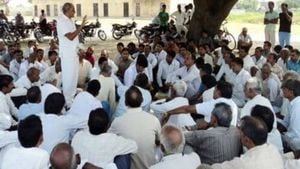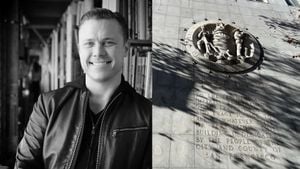On December 16, 2023, solemn memorial ceremonies were held across regions to mark two significant anniversaries of harrowing terrorist attacks: the 10th anniversary of the Army Public School (APS) attack in Peshawar, Pakistan, and the 16th anniversary of the Indian Parliament attack. Both events serve as stark reminders of the devastating impact of terrorism on innocent lives and the collective anguish felt by affected families and communities.
At the Kashmir Press Club in Mirpur, AJK, speakers and attendees gathered to pay tribute to the victims of the APS massacre. The ceremony was led by the president of the Kashmir Press Club, Syed Abid Shah, and attended by members of the civil society who offered prayers for the martyrs. These prayers were not just for the souls lost but also for Pakistan’s stability, security, and prosperity. Shah emphasized, “We are united against terrorism,” reinforcing the collective sentiment shared among those present.
The APS attack, which occurred on December 16, 2014, resulted in the loss of 149 lives, including 132 children aged between eight and eighteen. The attack, which was executed by six gunmen affiliated with the Tehrik-i-Taliban Pakistan (TTP), is remembered as one of the most tragic incidents of terrorism in Pakistan’s history. Participants at the memorial condemned the brutality of the attack and expressed solidarity with the nation’s fight against terrorism.
One speaker remarked about the deep sorrow this incident caused, stating, “The Peshawar massacre was the worst incident in Pakistan’s history,” highlighting the lasting emotional scars it left behind. They praised the sacrifices made by the children and criticized those who perpetrate such violence, underscoring the notion shared by many: “Terrorists have no religion and are enemies of the country and nation.”
Meanwhile, on December 13, 2023, Indian Prime Minister Narendra Modi, alongside several members of Parliament, also paid homage to the victims of the 2001 Parliament attack, which left fourteen people dead, including five terrorists and six Delhi police personnel. At the memorial, which took place inside the Parliament building, Modi and former Prime Minister Dr. Manmohan Singh were seen reflecting on the terrorist act perpetrated by groups like Lashkar-e-Taiba and Jaish-e-Mohammed. The attack sparked severe tensions between India and Pakistan, emphasizing the volatility of security challenges within the region.
The commemorative observance highlighted the historical significance of the Parliament attack, with the assailants entering the complex disguised as officials. This invasion of the nation’s political heart shocked the populace and represented a direct assault on the country's democratic institutions. Notably, famed politician LK Advani was inside the Parliament during the attack, making it even more impactful as memories of those harrowing moments were recounted during the memorial.
The tension arising from the attacks also prompted India to bolster its security measures and reshape its anti-terrorism strategies significantly. Modi's government reiterated its commitment to counter-terrorism efforts during the memorial, ensuring citizens and officials of their resolve to uphold the sanctity of the democratic process and safeguard national security.
These annual observances not only serve to honor the lost lives but also aim to remind current and future generations of the dire consequences of extremism. Both nations are continuously engaged in remembrance and response to these tragic events, standing together against the harrowing legacy of terrorism.
Reflecting on these moments from history, it is evident how deeply rooted the scars of such attacks persist within societies. The names and faces of the innocent lives lost remain etched in the collective memory of the nations involved, reinforcing the imperative need for global cooperation against terrorism. Each year, as these memorials take place, they pave the way toward hope for healing and peace.



